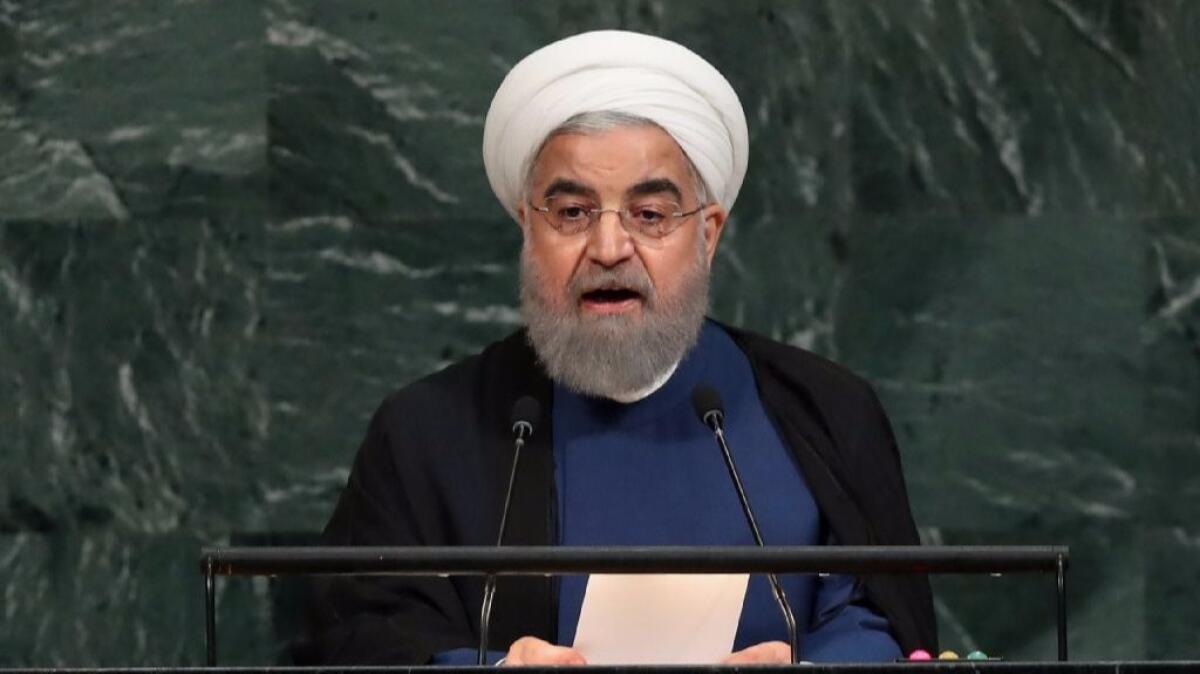Trump’s national security aides voice support for the Iran nuclear deal

- Share via
Reporting from WASHINGTON — Several of President Trump’s top national security advisors are urging him to stay in the Iran nuclear accord as the White House faces a looming deadline on whether to let Congress help determine the fate of the landmark disarmament deal.
Under U.S. law, Trump must tell Congress by Oct. 15 whether Iran is in compliance with the 2015 pact. Trump is leaning toward saying Iran is not, according to a person close to the White House, although the president has not made a final decision.
For the record:
2:15 p.m. Oct. 4, 2017An earlier version of this article misspelled Maryland Democratic Sen. Ben Cardin’s last name as Carden.
Secretary of State Rex Tillerson said at a news conference Wednesday that he and other senior aides will give Trump “a couple of options” on how to proceed. “We’ll have a recommendation for the president,” Tillerson said, describing the nuclear deal as “only a small part” of U.S. concerns with Iran.
But Defense Secretary James N. Mattis and Gen. Joseph F. Dunford Jr., chairman of the Joint Chiefs of Staff, both told Congress on Tuesday that the nuclear accord has made the U.S. safer and they support keeping it intact.
“I believe at this point in time, absent indications to the contrary, it is something that the president should consider staying with,” Mattis told the Senate Armed Services Committee.
Sen. Angus King (I-Maine) asked Mattis whether he believed it was in the United States’ national security interest to stay in the deal, which required Iran to destroy or disable most of its nuclear infrastructure in exchange for sanctions relief.
“Yes, Senator, I do,” Mattis replied. He later told the House Armed Services Committee that U.S. intelligence supports assessments by the International Atomic Energy Agency, the United Nations nuclear watchdog agency, that Iran is in compliance.
During the campaign last year, Trump repeatedly vowed to rip up the Iran deal. After he took office he ordered a wide-ranging review of U.S. policy on Iran that is still underway. White House officials now are preparing a harsh speech on Iran that Trump could deliver as soon as next week.
It would allow the president to explain why he believes Iran is not in full compliance, and to air his complaints about Iran’s ballistic missile program, its support for terrorist groups and other activities that are not covered under the nuclear agreement.
If Trump ultimately decides not to certify that Iran is in compliance, or declare that the nuclear deal is not vital to U.S. national security interest, a 2015 law gives Congress 60 days to act. The U.S. law is separate from the international accord.
If lawmakers decide to reimpose nuclear-related sanctions without clear evidence of Iranian violations, which they could do with a simple majority of votes in the Senate, the U.S. would have reneged on its end of the agreement and Iran has said it would consider the deal void.
Trump administration officials believe that threat could give them leverage to press European allies to help fix what they see as weaknesses in the accord by negotiating new amendments with Iran. Within the administration, that strategy is being called “decertify and fix.”
Among the concerns, the administration wants greater access to Iranian military sites by U.N. inspectors, stiffer monitoring and verification requirements, curbs on Iran’s ballistic missile program and an extension of the so-called sunset clauses when some parts of the accord expire.
One line of diplomacy under consideration is to persuade Britain, France and Germany to impose harsh financial sanctions if Iran later shows signs of enriching fissile material or restarting centrifuges to enrich uranium, even after the sunset clauses have lapsed.
Iranian officials have flatly rejected proposals for greater access to their country’s military bases and have ruled out renegotiating or adding annexes to the pact, known as the Joint Comprehensive Plan of Action. In a recent tweet, Iranian Foreign Minister Mohammad Javad Zarif wrote, “The #JCPOA is not (re)negotiable. A ‘better’ deal is pure fantasy.”
There are other options if Trump does not recertify Iran’s compliance. Congress could decide to impose sanctions that don’t violate the deal but increase pressure. It could even amend the Iran Nuclear Agreement Review Act, which requires the president to report back every 90 days, a mandate Trump abhors.
Trump already has issued the certification notice to Congress twice since he took office. His top aides appear split on whether he should do it again this month.
Secretary of State Tillerson and Treasury Secretary Steven T. Mnuchin both argued last month that Trump should certify Iranian compliance at least once more to give them more time to fix the deal.
But CIA Director Mike Pompeo counseled Trump in July to declare that the accord is not in the country’s national security interest. Nikki Haley, the U.S. ambassador to the United Nations, also has advised Trump not to certify.
National security advisor H.R. McMaster has argued that the fight over the nuclear deal has distracted policymakers from Iran’s other troubling actions, including waging cyberattacks, developing ballistic missiles, holding U.S. citizens and supporting armed proxy groups in Yemen, Iraq and Syria.
Supporters of the nuclear accord worry that Trump will hand off the decision to members of Congress who are determined to simply kill the deal.
“It’s not too late for President Trump to do the right thing for U.S. national security,” Sen. Ben Cardin of Maryland, the ranking Democrat on the Senate Foreign Relations Committee, said Wednesday. “The very credibility of the United States is on the line, and the world is watching.”
Some Republicans argue that better enforcement, not renegotiation, is the best course of action.
Rep. Ed Royce (R-Fullerton), who chairs the House Foreign Relations Committee, said on CNN that the United States should stick with the deal but “enforce the hell out of it.”
He urged the administration to find other ways to rein in Iran’s ballistic missile program and other activities not covered by the nuclear deal, without destroying the existing accord.
The 2015 agreement sought only to block Iran from building a nuclear weapon. The U.S. maintains separate economic sanctions on Iran for its ballistic missile program and its support for terrorist groups.
In Senate testimony on Sept. 26, Dunford offered another argument for keeping the deal intact.
Breaking the agreement without hard evidence of Iranian violations, he warned, would undercut the United States’ ability to negotiate other disarmament deals, especially with nuclear-armed North Korea.
“It makes sense to me that our holding up agreements that we have signed, unless there’s a material breach, would have an impact on others’ willingness to sign agreements,” Dunford said.
For more on international affairs, follow @TracyKWilkinson on Twitter
UPDATES:
1:10 p.m., Oct. 4: This article was updated with remarks from Secretary of State Rex Tillerson and Sen. Ben Cardin (D-Md.).
This article was originally published at 5 p.m., Oct. 3.
More to Read
Sign up for Essential California
The most important California stories and recommendations in your inbox every morning.
You may occasionally receive promotional content from the Los Angeles Times.













